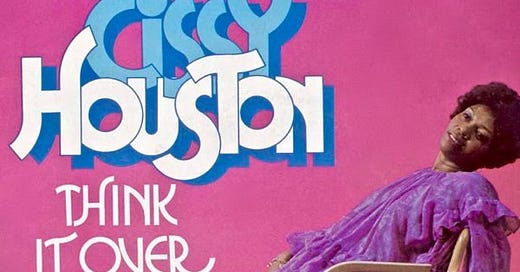Cissy Houston: How 4 Missed Opportunities Shaped Her Career—and Paved the Way for Whitney Houston's Stardom
The Twelve Inch 138 : Think It Over (Cissy Houston)
A Hidden Legend: Cissy Houston’s Story in the Shadow of Whitney
October 7th marked the passing of Cissy Houston, known widely as Whitney Houston's mother. But Cissy herself was an extraordinary singer, navigating a career defined by near-breakthroughs and missed chances. Unlike Whitney’s meteoric rise, Cissy’s journey was quieter, marked by moments of a…
Keep reading with a 7-day free trial
Subscribe to The Twelve Inch to keep reading this post and get 7 days of free access to the full post archives.




